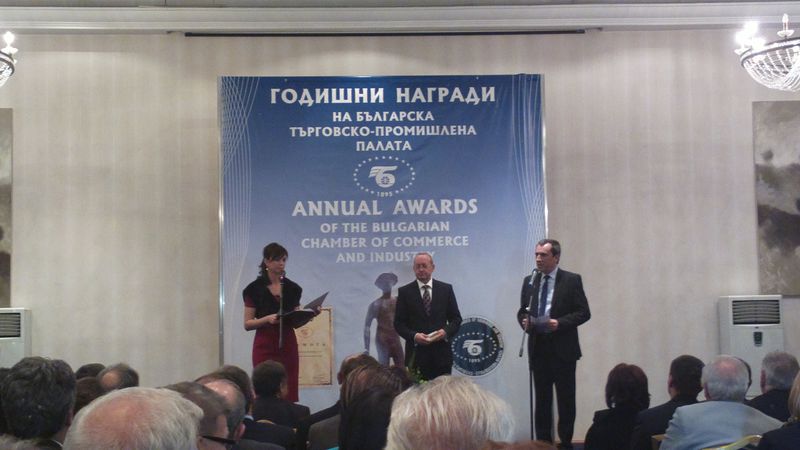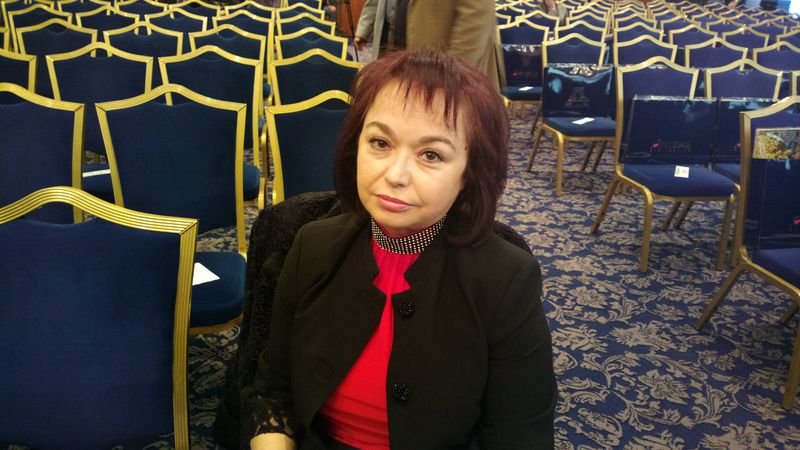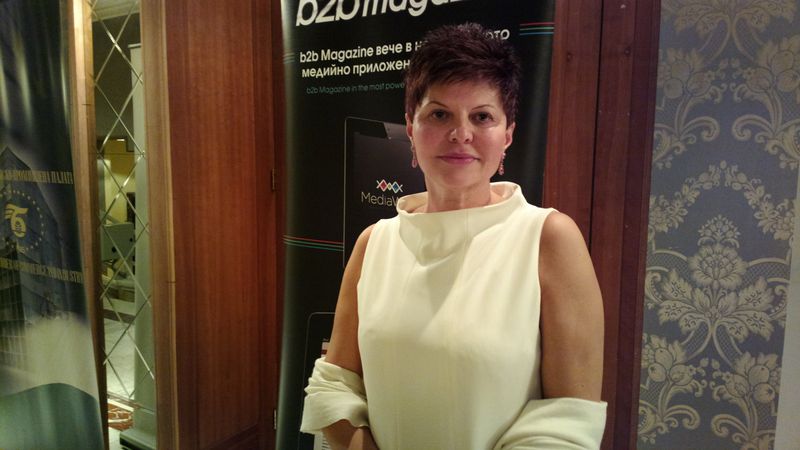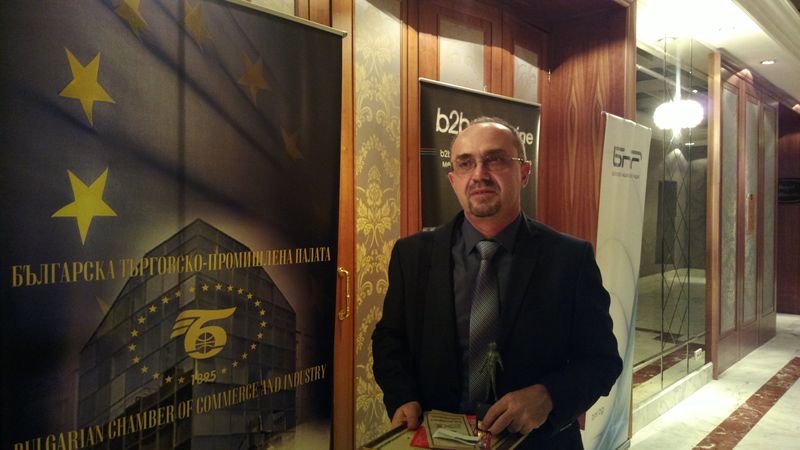Business Wants Access to Cheap Credit. Believes Economy Is on a Standstill
Adelina Marini, December 10, 2013
 Prizes for economic survival should be given in Bulgaria. This is what I thought while I was waiting for the beginning of the ceremony of the annual awards of the Bulgarian Chamber of Commerce and Industry (BCCI) in Sofia on December 3rd. A round anniversary - 20 years. The mood, however, in the hall room and outside was oppressive and did not suggest any solemnity. Around the Sheraton hotel, which is situated near the government buildings and the square which is home to the protests this year, security was tight because of the expected attendance of Prime Minster Plamen Oresharski. An attendance that was met in the room with vague applause. All awarded euinside spoke to had one major recommendation for the prime minister - to facilitate crediting for small and micro businesses.
Prizes for economic survival should be given in Bulgaria. This is what I thought while I was waiting for the beginning of the ceremony of the annual awards of the Bulgarian Chamber of Commerce and Industry (BCCI) in Sofia on December 3rd. A round anniversary - 20 years. The mood, however, in the hall room and outside was oppressive and did not suggest any solemnity. Around the Sheraton hotel, which is situated near the government buildings and the square which is home to the protests this year, security was tight because of the expected attendance of Prime Minster Plamen Oresharski. An attendance that was met in the room with vague applause. All awarded euinside spoke to had one major recommendation for the prime minister - to facilitate crediting for small and micro businesses.
Rositsa Savcheva is a manager of Sport Line Elite, a company that was awarded the first place in the category of funding with own funds. She described the business environment in Bulgaria as "rather difficult". The market is contracted, there are no alleviations for the business, on the contrary. The firm works thanks to its clients abroad, a large part of whom are in Europe, Canada and US. According to Ms Savcheva, there was a favourable business environment 7-8 years ago. Since then there is a permanent decline. Then there were more Bulgarian clients and there was no problem with payments. Now, she says, the biggest impediment to business is delayed payments.
She works mainly with state-owned companies and believes that they are the most difficult to work with. They delay payments. She is trying to show understanding to them saying that they have small budgets, money is insufficient. Those are mainly sports federations who order costumes for Olympic games or other sporting events, but the company is a producer. It buys materials, makes the clothes and then it waits for its money. While waiting it gets consumer credit or mortgages to ensure money to work with. If she had an opportunity to talk to Premier Oresharski, she would tell him that companies need money to work with, especially small companies. Banks do not lend to micro companies that have no assets.
EU funds are also not good for her because, as she explains, they are usually huge amounts of money. "I want less money, for example ten thousand or twenty thousand euros". She would rather want some schemes for micro credit. Tells me she recently read an article according to which 48% of the enterprises in Europe are like hers - micro companies, but they have a 50% share in the economy. According to her, in Bulgaria there are many micro firms, but the environment is not good in the country. They rely mainly on foreign clients. There are administrative obstacles, among which Ms Savcheva outlined the non-return of overpaid taxes and their transfer to cover future contributions. She mentioned another problem too, which she clashes with - the lack of initiative of Bulgarians. She has a desire to  open new jobs, but she sought people for three months to work with. Many showed up, but she could not choose.
open new jobs, but she sought people for three months to work with. Many showed up, but she could not choose.
What is the problem? "They lack courage to do different things, more difficult things. Well paid, but difficult. They lack initiative", she explains simply. She was awarded by PM Oresharski himself, who wished more companies to be worth prizes. But what prizes is the question. Engineer Silvia Petrova shares a large part of Rositsa Savcheva's concerns. Ms Petrova is a chairwoman of the Bulgarian association of traders of medical products. She was the star of the ceremony of the BCCI. A solid PR was invested in her performance. She was the only one to be given a large bunch of flowers, applause and after she was awarded she made her way to stand beside the prime minster. Her media assistant was very persisting in inviting media to talk to Ms Petrova.
She, too, complained from the state-owned companies, in her area those are the hospitals. The association she chairs consists of 42 firms which import 80% of all the medical appliances and supplies. "We credit the health care system", she says, because hospitals do not pay between a year and three years, while producers provide us with no more than 3-6 months of postponed payments. Banks hardly provide credit and if they do it is very expensive. "Imagine if we put 10%-12% interest rate what will happen to prices! And the end consumer, and that is the patient, again has to pay dearly for this". Another problem she pointed to was the law on public procurement. In health care, she explains, it is hard to work with this law because in this area there always is urgency. "When something lacks in a  hospital a dying patient hardly cares whether the product he or she needs was bought through public procurement".
hospital a dying patient hardly cares whether the product he or she needs was bought through public procurement".
Besides, the hospitals and companies are not equally footed. That is why she said if she had a chance to talk to Premier Oresharski she would tell him to facilitate the atmosphere for development of small and medium sized businesses in Bulgaria because this is the foundation of the economy of every country. She was convinced she would have such a chance because she has a lot of ideas for the health care. She wants to organise economic fora and to gather together all the interested parties - the citizens, government and companies because "this is our biggest problem - all of us to go in one direction", she concluded.
Krassimir Topuzov, Tokomi Ltd, got the prize for companies with reduced debt. He found it hard to assess the current economic situation because it was too early. From my conversation with him it became clear he measured the business environment according to government cycles. According his a measurement system, the economy saw some upward movements two and a half years ago, followed by a long period of standstill of a year and a half. By upward movements he meant the opening of EU programmes and funds for Bulgaria. He described his company as being on the border between a micro and a small one which recently won a project under EU programmes. Unlike 10 years ago when he applied unsuccessfully, now he says it was much easier. His company even wrote the project itself. But without the EU funds, he would have never realised his project. In Bulgaria, there are no possibilities for funding.
He, too, would advise the government to do so that the banking system in Bulgaria would open for small and medium business. "First I would put the work of the banking system. This is crucial. A prosperous business cannot work without funding from a bank", he said and added that there were great ideas, but when they cannot be realised because of the lack of funding "it is a great pity for a country like Bulgaria".
The BCCI President Tsvetan Simeonov also described the current situation as a standstill. "In spite of the good macro economic indicators, in spite of the desire to simplify the life of businesses still the e-government is not happening which is one of the most serious problems to investors, both Bulgarian and foreign. The access to credit is difficult, which is also a significant impediment". The third serious reason for the economic standstill, according to Mr Simeonov, is the too "dynamic", as he put it, legislation. Often the changes to legislation are surprising for the business. It would be better if in the future it sought an impact assessment of every new piece of legislation. The Chamber is working on a long list, in Mr Tsvetan Simeonov's words, of specific proposals for amendments to laws and provisions that could  untap the business. The list will soon be presented to the government right after the consultations among the members of the chamber end.
untap the business. The list will soon be presented to the government right after the consultations among the members of the chamber end.
At the opening of the ceremony, the prime minster said enough positive signals had been sent to the business. He recalled the recently adopted changes for accelerated payback of the state to companies and the more regular payback of VAT. He also recalled the introduction of cash based accounting for small companies which will now owe VAT only after they got their payments. He also said work was ongoing to improve the access of small companies to cheaper loans. The feeling of the business of perspective, however, would hardly feel the "positive signals" of the government, especially given that this feeling coincides entirely with the European Commission's vision about the development of the Bulgarian economy. In its autumn forecast, the Commission revised downward its expectation for the economic growth of the Bulgarian economy, which did not prevent the government from setting a much higher expectation.
For the first time in the multiannual EU budget, a separate sum will be allocated to small and medium-sized enterprises. In the period 2014-2020, the COSME programme will be funded by 2.3 billion euros in support of competitiveness of small companies and their access to markets both in the EU and outside. The programme will work in the form of guarantees for loans and risk capital. This is supposed to bring relief to all whom euinside spoke with, but the other problems they raised remain entirely in the hands of national authorities.